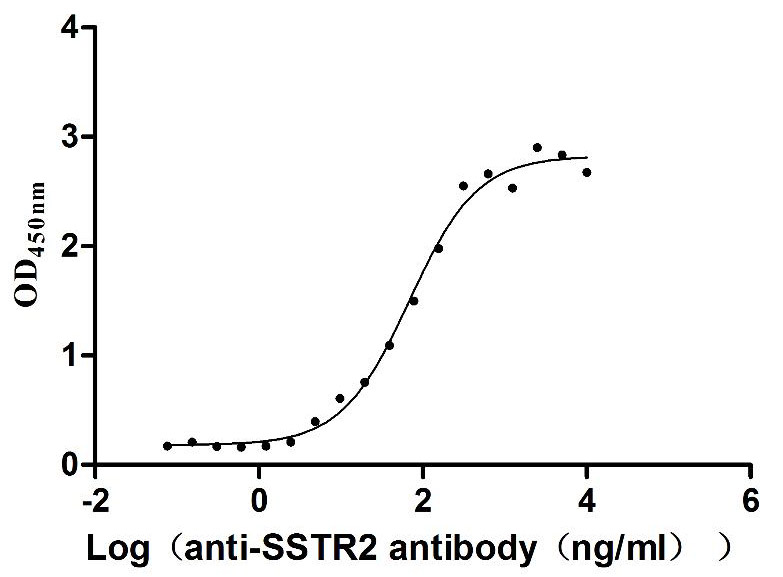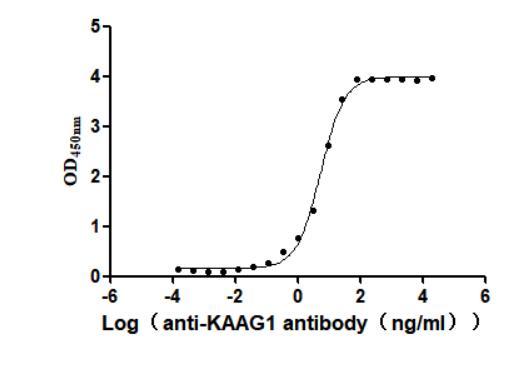Recombinant Rotavirus A RNA-directed RNA polymerase, partial
-
中文名稱:Recombinant Rotavirus A RNA-directed RNA polymerase ,partial,Yeast
-
貨號:CSB-YP323779RGJ
-
規(guī)格:
-
來源:Yeast
-
其他:
-
中文名稱:Recombinant Rotavirus A RNA-directed RNA polymerase ,partial,Yeast
-
貨號:CSB-EP323779RGJ
-
規(guī)格:
-
來源:E.coli
-
其他:
-
中文名稱:Recombinant Rotavirus A RNA-directed RNA polymerase ,partial,Yeast
-
貨號:CSB-EP323779RGJ-B
-
規(guī)格:
-
來源:E.coli
-
共軛:Avi-tag Biotinylated
E. coli biotin ligase (BirA) is highly specific in covalently attaching biotin to the 15 amino acid AviTag peptide. This recombinant protein was biotinylated in vivo by AviTag-BirA technology, which method is BriA catalyzes amide linkage between the biotin and the specific lysine of the AviTag.
-
其他:
-
Recombinant Rotavirus A RNA-directed RNA polymerase ,partial,Yeast
-
貨號:CSB-BP323779RGJ
-
規(guī)格:
-
來源:Baculovirus
-
其他:
-
中文名稱:Recombinant Rotavirus A RNA-directed RNA polymerase ,partial,Yeast
-
貨號:CSB-MP323779RGJ
-
規(guī)格:
-
來源:Mammalian cell
-
其他:
產(chǎn)品詳情
-
純度:>85% (SDS-PAGE)
-
基因名:N/A
-
Uniprot No.:
-
別名:; RNA-directed RNA polymerase; EC 2.7.7.48; Protein VP1
-
種屬:Rotavirus A (strain Cow/France/RF/1975 G6-P6[1]-I2-R2-C2-M2-A3-N2-T6-E2-H3) (RV-A)
-
蛋白長度:Partial
-
蛋白標(biāo)簽:Tag?type?will?be?determined?during?the?manufacturing?process.
The tag type will be determined during production process. If you have specified tag type, please tell us and we will develop the specified tag preferentially. -
產(chǎn)品提供形式:Lyophilized powder
Note: We will preferentially ship the format that we have in stock, however, if you have any special requirement for the format, please remark your requirement when placing the order, we will prepare according to your demand. -
復(fù)溶:We recommend that this vial be briefly centrifuged prior to opening to bring the contents to the bottom. Please reconstitute protein in deionized sterile water to a concentration of 0.1-1.0 mg/mL.We recommend to add 5-50% of glycerol (final concentration) and aliquot for long-term storage at -20℃/-80℃. Our default final concentration of glycerol is 50%. Customers could use it as reference.
-
儲存條件:Store at -20°C/-80°C upon receipt, aliquoting is necessary for mutiple use. Avoid repeated freeze-thaw cycles.
-
保質(zhì)期:The shelf life is related to many factors, storage state, buffer ingredients, storage temperature and the stability of the protein itself.
Generally, the shelf life of liquid form is 6 months at -20°C/-80°C. The shelf life of lyophilized form is 12 months at -20°C/-80°C. -
貨期:Delivery time may differ from different purchasing way or location, please kindly consult your local distributors for specific delivery time.Note: All of our proteins are default shipped with normal blue ice packs, if you request to ship with dry ice, please communicate with us in advance and extra fees will be charged.
-
注意事項(xiàng):Repeated freezing and thawing is not recommended. Store working aliquots at 4°C for up to one week.
-
Datasheet :Please contact us to get it.
靶點(diǎn)詳情
-
功能:RNA-directed RNA polymerase that is involved in both transcription and genome replication. Together with VP3 capping enzyme, forms an enzyme complex positioned near the channels situated at each of the five-fold vertices of the core. Following infection, the outermost layer of the virus is lost, leaving a double-layered particle (DLP) made up of the core and VP6 shell. VP1 then catalyzes the transcription of fully conservative plus-strand genomic RNAs that are extruded through the DLP's channels into the cytoplasm where they function as mRNAs for translation of viral proteins. One copy of each of the viral (+)RNAs is also recruited during core assembly, together with newly synthesized polymerase complexes and VP2. The polymerase of these novo-formed particles catalyzes the synthesis of complementary minus-strands leading to dsRNA formation. To do so, the polymerase specifically recognizes and binds 4 bases 5'-UGUG-3' in the conserved 3'-sequence of plus-strand RNA templates. VP2 presumably activates the autoinhibited VP1-RNA complex to coordinate packaging and genome replication. Once dsRNA synthesis is complete, the polymerase switches to the transcriptional mode, thus providing secondary transcription.
-
亞細(xì)胞定位:Virion.
-
蛋白家族:Reoviridae RNA-directed RNA polymerase family
Most popular with customers
-
Recombinant Human CD48 antigen (CD48) (Active)
Express system: Mammalian cell
Species: Homo sapiens (Human)
-
Recombinant Dog Angiopoietin-2 (ANGPT2) (Active)
Express system: Mammalian cell
Species: Canis lupus familiaris (Dog) (Canis familiaris)
-
Recombinant Human Somatostatin receptor type 2 (SSTR2)-VLPs (Active)
Express system: Mammalian cell
Species: Homo sapiens (Human)
-
Recombinant Human Mucin-17 (MUC17), partial (Active)
Express system: Mammalian cell
Species: Homo sapiens (Human)
-
Recombinant Macaca fascicularis C-type lectin domain family 4 member C(CLEC4C), partial (Active)
Express system: Mammalian cell
Species: Macaca fascicularis (Crab-eating macaque) (Cynomolgus monkey)
-
Recombinant Human Kidney-associated antigen 1(KAAG1) (Active)
Express system: Baculovirus
Species: Homo sapiens (Human)
















